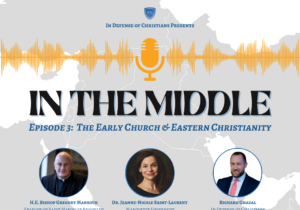When enumerating the images associated with capitalism, one such impression is of wealthy merchants exploiting the poor. Similarly, when moneylending is mentioned, visions of miserly Ebenezer Scrooge spring to mind. Yet surprisingly, the first thinker to produce a systematic treatise on what is today called the Science of Economics, and among the first to argue that earning profit and charging interest is not sinful, was Renaissance-era Dominican monk St. Antonio of Florence.1
Contrary to modern notions of what it means to be a capitalist or a socialist, St. Antonio was a social economist who cared deeply for people. He realized that if unfair monopolies controlled by the rich were removed, free markets would give hard-working citizens the chance to improve their lives. In essence, he envisioned the system that, over 300 years later, would enable the United States of America to create the world’s largest middle class.
St. Antonio (1389–1459) was born Antonio Pierozzi in Florence. At age 16, he was admitted to the Dominican Order, ultimately serving as Archbishop of Florence from 1446 until his death. During this era, Florence was ruled by Cosimo de’ Medici and was one of the richest cities on Earth.2 Many economists regard Florence as the birthplace of capitalism, owing to its urbanization, industrialization, trade networks, and sizable banking sector.
St. Antonio was a member of the Scholastics, a philosophical tradition largely led by Catholic monks from Italy and Spain. From around 1150 to 1450, the Scholastics utilized a mix of Catholic, Jewish and Islamic religious principles combined with Aristotelian philosophy to conduct economic thought experiments3. The thinking of St. Antonio and similar philosophers, like St. Thomas Aquinas, was ahead of its time and broke with long-held traditions and beliefs.
Early Christian scholars discouraged entrepreneurship because profit-seeking necessarily led to avarice. St. Antonio agreed that traders and entrepreneurs may be led to sin, but so could other professions.4 St. Antonio argued that, from a position of Christian faith, the acquisition of wealth was not intrinsically sinful so long as the money was earned honestly and not spent sinfully. To determine what constituted the honest acquisition of wealth, St. Antonio referred to the Ten Commandments and the Canonical law. Along with the Bible, he cited these two documents because they were the most widely accepted standards of morality. It was a sin to lie, steal, or cheat, and therefore contracts had to be legally enforced by the government. This would encourage people to invest money, he wrote. No one would invest in a business if they thought their investment could be stolen. What’s more, he regarded contract enforcement as one of the few areas where the government should involve itself in the economy.
In 1776 Adam Smith, the father of modern economics, published An Inquiry into the Nature and Causes of the Wealth of Nations, a work that changed the course of history. In it, Smith stated that the economy would work most efficiently if the government limited itself to protecting national borders, keeping public order, and upholding property rights. This is exactly what St. Antonio had outlined in his great work of 1477, Summa Theologica Moralis.
Profits could be earned, in St. Antonio’s reckoning, if they were moderate and used to support families or help the poor5. His idea of moderate profits was that a “just price” should be charged for goods and services. But unlike modern socialists, who believe the government should decide what the just price is, St. Antonio regarded the just price as being whatever buyers and sellers arrive on without coercion. In effect, he was describing a free market where buyers and sellers are free to do business with whomever they choose.
One of his most innovative concepts was his theory of the economy as a system. Today, we call this the circular flow. In a simple yet brilliant observation, St. Antonio realized that there were two major players in the economy: firms and households. The former produces products and services, while the latter consumes them. This much had been known for centuries, but St. Antonio took this idea a step further by completing the circular flow. He recognized that firms bought inputs and raw materials to make goods and services, and that one of those inputs was labor, which is purchased from households.
In the circular flow model, a worker receives a wage which is then used to buy groceries and clothing. The worker sells their labor to the firm, and the firm buys the labor to make goods and services, which the firm sells. The worker then receives a payment for selling their labor and uses that payment to buy other goods and services. This cycle repeats countless times per day across the world every day of human existence. This is our economy.
Once St. Antonio completed the circle, he realized that if firms could set the price at which they sold goods and services, workers should be able to set the price at which they sold their labor. But, even more forward thinking, he believed that unions and syndicates, which forced employers to pay a certain wage, distort markets. He advocated for a free market for labor, just as there was a free market for shoes, bread or any other product. This way, workers who were more productive could command higher wages and thus get richer. It would be centuries until the circular flow diagram entered the lexicon of economics.
St. Antonio’s philosophy regarding lending is a classic example of his melding of Christian ideals with economics. Early Christian and Islamic scholars believed that the charging of interest was prohibited by the Bible, specifically Deuteronomy 23:20. The Scholastics, however, also understood that compensation and profit were at the core of commerce. As for profit, the reason a worker does one job over another is so they can earn more. The reason a firm specializes in one product over another is so it can earn more by selling it. And that “more” is the profit.
Consequently, if it is permissible in Christian ethics to earn a profit from working or to sell a product at profit, why would it be immoral to earn a profit on money? And here is where St. Antonio derived a whole slew of innovative economic concepts. He recognized that someone lending money had to be compensated for the risk. He also recognized that the lender has a choice, in a free market, to do what they wish with their money. Because they will invest their money into the most profitable activities, interest on a loan must be enough to compensate the lender for the next best use of his money. If you could invest your money for a 3% return or loan it out, you would have to charge at least 3% interest to compensate for the opportunity cost incurred. To this day, the concepts of opportunity cost and the time value of money are at the foundation of our modern economy.
Today, we see a world where many wish to forget the wisdom of the past. In abandoning religious morality, they believe they will find more happiness or, in the case of socialism, more equitable outcomes. But it was by maintaining our moral values, rooted in scripture, that a system of guaranteed rights and laws which made America one of the richest and freest societies ever was established.
When Adam Smith wrote The Wealth of Nations in 1776 and America’s Founding Fathers signed the Declaration of Independence, human beings lived in a world of limited upward mobility. Yet despite Smith’s reputation as the first expositor of economic freedom, capitalism’s theoretical underpinnings were first articulated hundreds of years earlier by St. Antonio and the Scholastics; it was these Renaissance scholars who recognized that the amelioration of poverty and creation of a fairer society could be accomplished through free markets. Though capitalism’s rise was not immediate, by the end of the 19th century, nations like the United States were so far ahead that there could be no contest. St. Antonio has been proven right beyond any shadow of a doubt.
(1) Alexandrin, G., & Poulatis, S. S. (2001). “Social Economist: St Antonino, Bishop of Florence, 13841459.” International Journal of Social Economics, 28(5/6/7), 561–576. https://doi.org/10.1108/03068290110360830
(2) Brown, J. A. (2019). St Antonin of Florence on Justice in Buying and Selling: Introduction, Critical Edition, and Translation [Doctoral dissertation, Centre for Medieval Studies, University of Toronto]. Toronto.
(3) Langholm, O. (1998). The Legacy of Scholasticism in Economic Thought. Cambridge University Press. https://doi.org/10.1017/CBO9780511528491
(4) Rothbard, M. N. (1975). “San Bernardino of Siena: Economics and the Entrepreneur.” Journal of Christian Reconstruction Symposium on Christian Economics, Vol. 2 (1).
(5) Caferro, W. (2020, April 30). “Premodern European capitalism, Christianity, and Florence.” Business History Review, Vol. 94, 39–72. https://doi.org/10.1017/S0007680520000045





